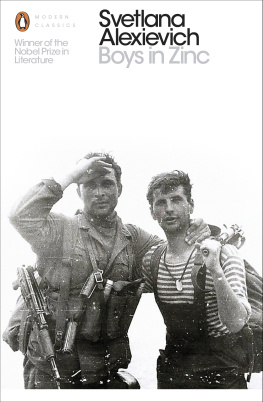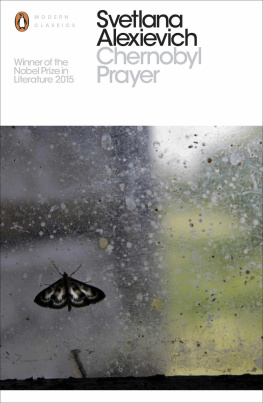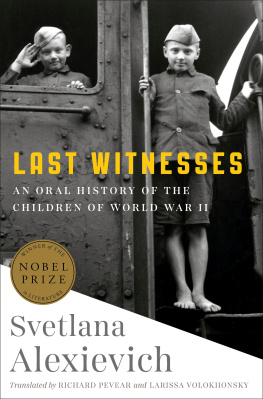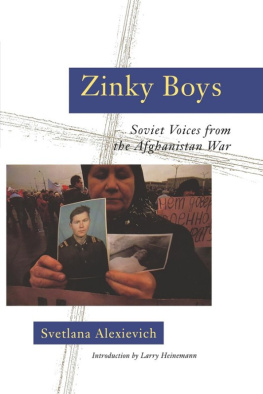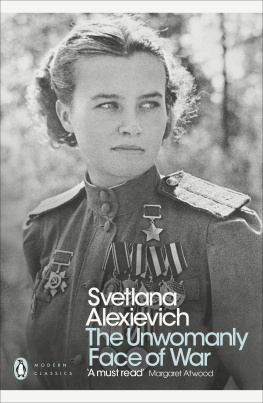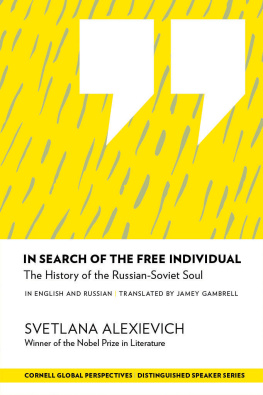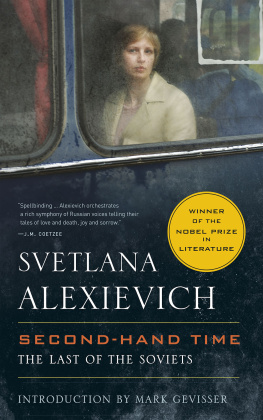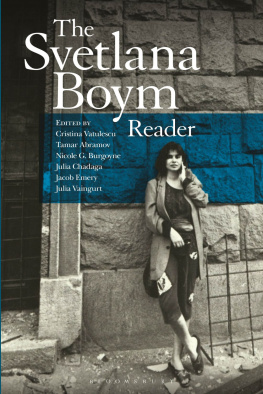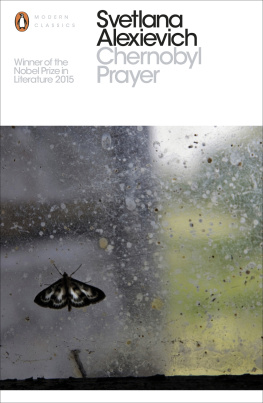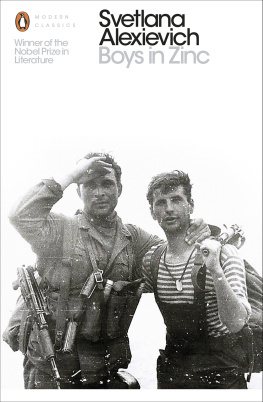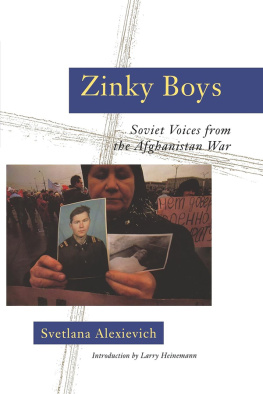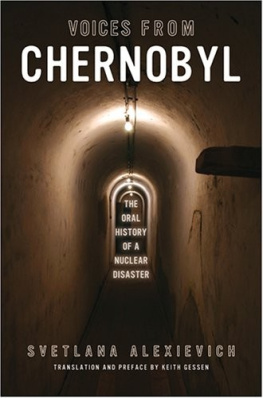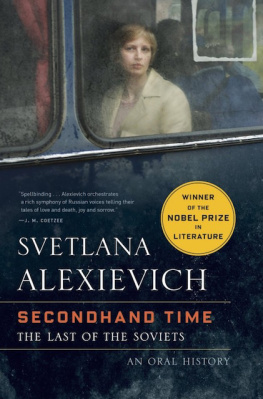Svetlana Alexievich - Boys in Zinc
Here you can read online Svetlana Alexievich - Boys in Zinc full text of the book (entire story) in english for free. Download pdf and epub, get meaning, cover and reviews about this ebook. City: Westminster, year: 2017, publisher: Penguin Books, genre: History. Description of the work, (preface) as well as reviews are available. Best literature library LitArk.com created for fans of good reading and offers a wide selection of genres:
Romance novel
Science fiction
Adventure
Detective
Science
History
Home and family
Prose
Art
Politics
Computer
Non-fiction
Religion
Business
Children
Humor
Choose a favorite category and find really read worthwhile books. Enjoy immersion in the world of imagination, feel the emotions of the characters or learn something new for yourself, make an fascinating discovery.
- Book:Boys in Zinc
- Author:
- Publisher:Penguin Books
- Genre:
- Year:2017
- City:Westminster
- Rating:3 / 5
- Favourites:Add to favourites
- Your mark:
- 60
- 1
- 2
- 3
- 4
- 5
Boys in Zinc: summary, description and annotation
We offer to read an annotation, description, summary or preface (depends on what the author of the book "Boys in Zinc" wrote himself). If you haven't found the necessary information about the book — write in the comments, we will try to find it.
Boys in Zinc — read online for free the complete book (whole text) full work
Below is the text of the book, divided by pages. System saving the place of the last page read, allows you to conveniently read the book "Boys in Zinc" online for free, without having to search again every time where you left off. Put a bookmark, and you can go to the page where you finished reading at any time.
Font size:
Interval:
Bookmark:



Svetlana Alexievich was born in Ivano-Frankivsk in 1948 and has spent most of her life in the Soviet Union and present-day Belarus, with prolonged periods of exile in Western Europe. Starting out as a journalist, she developed her own non-fiction genre which brings together a chorus of voices to describe a specific historical moment. Her works include The Unwomanly Face of War (1985), Last Witnesses (1985), Boys in Zinc (1991), Chernobyl Prayer (1997) and Second-Hand Time (2013). She has won many international awards, including the 2015 Nobel Prize in Literature for her polyphonic writings, a monument to suffering and courage in our time.
Andrew Bromfield earned his degree in Russian Studies at Sussex University and lived in Russia for several years. He has been a full-time translator of Russian literature for more than thirty years and is best known for translating modern authors, but his work also includes books on Russian art, Russian classics and nonfiction, with a range from Tolstoy to the Moscow Conceptualism Movement.
On 20 January 1801 the Cossacks of the Don Hetman Vasily Orlov were ordered to march to India. A month was set for the stage as far as Orenburg, and three months to march from there via Bukharia and Khiva to the Indus River. Soon thirty thousand Cossacks would cross the Volga and advance deep into the Kazakh Steppe
V borbe za vlast:
Stranitsy politicheskoi istorii Rossii XVIII veka
(In the Struggle for Power:
Pages from the Political History of Russia in the Eighteenth Century) (Moscow: Mysl, 1988), p. 475
In December 1979 the Soviet leadership took the decision to send its troops into Afghanistan. The war continued from 1979 to 1989, lasting nine years, one month and nineteen days. More than half a million soldiers of the limited contingent of Soviet forces passed through Afghanistan. The total number of lives lost by the Soviet Armed Forces was 15,051. Four hundred and seventeen military servicemen went missing in action or were taken prisoner. As of the year 2000, the number of men who had not returned from captivity and remained unaccounted for was 287
Polit.ru, 19 November 2003

I walk alone Ill be walking alone for a long time now.
He killed someone My son With a kitchen axe I used to trim and beat meat with it. He came back from the war and killed someone here. He brought the axe back in the morning and put it away in the little cupboard where I keep the kitchenware. I think it was the same day I cooked pork cutlets for him. After a while they announced it on the television and they wrote in the evening newspaper that some fishermen had pulled a dead body out of the town lake. In pieces A friend of mine called me:
Did you read it? A professional murder With the Afghan signature
My son was at home, lying on the sofa, reading a book. I didnt know anything yet, I didnt suspect a thing, but for some reason when she said that I looked at him. A mothers heart
Can you hear the dogs barking? No? But I can, as soon as I start telling anyone about it, I hear dogs barking. And dogs running In the prison where hes serving his time now, there are big black Alsatians. And the people are all dressed in black, nothing but black. I get back to Minsk and I walk along the street, past the bread shop and the kindergarten, carrying a long loaf and some milk, and I hear that barking. That deafening barking. It blinds me. Once I almost got run over by a car.
Id be willing to visit my sons grave mound. Id be willing to lie there beside him. But I dont know I dont know how to live with this. Sometimes I feel afraid to go into the kitchen and see that cupboard where the axe used to lie. Cant you hear it? Dont you hear anything?
Now I dont even know what hes like, my son. What will he be like when I get him back in fifteen years? They gave him fifteen years in maximum security. How did I bring him up? He was interested in ballroom dancing. The two of us used to go to the Hermitage in Leningrad. We read books together (She cries.) It was Afghanistan that took my son away from me
We got a telegram from Tashkent: Meet such-and-such a plane I dashed out on to the balcony, I wanted to shout out with all my might: Hes alive! My son has come back alive from Afghanistan! That terrible war is over for me! And I passed out. We got to the airport late, of course, our flight had arrived ages ago, and we found our son in the public garden. He was lying on the ground and clutching the grass, amazed that it was so green. He couldnt believe that he was back. But there was no joy in his face
In the evening the neighbours came round. They have a little girl and they tied a bright blue ribbon in her hair. He sat her on his knees, held her tight and cried: the tears just kept flowing on and on. Because they killed out there. And so did he I realized that later.
On the border the customs men had trimmed off his foreign shorts. American. Not permitted. So he arrived without any underwear. He was bringing a dressing gown for me; I turned forty that year. They took the dressing gown away from him. He was bringing his granny a shawl and they took that too. The only thing he had when he arrived was flowers. Gladioli. But there was no joy in his face.
When he got up in the morning he was still normal: Mama! Mama! By evening his face had turned dark, his eyes were heavy with pain. I cant describe it to you He didnt drink at first, not a drop, just sat there looking at the wall. He would spring up off the sofa and grab his jacket.
I used to stand in the doorway.
Where are you going, Valyushka?
He just looked straight through me. And went out.
I used to come back home late from work the factorys a long way away and ring the doorbell, but he didnt open up. He didnt recognize my voice. Its so strange after all, he might not recognize his friends voices, but mine! And especially Valyushka Im the only one who ever called him that. It was like he was expecting someone all the time; he was afraid. I bought him a new shirt and started trying it on him for size, and I saw cuts all over his arms.
Whats this?
Its nothing, mama.
I found out about it later. After the trial. In the training camp he slit his wrists At an exercise he was a radio operator and he didnt manage to heave the radio up into a tree in time, he took longer than was allowed, and the sergeant made him rake out fifty bucketsful from the toilet and carry it all across in front of the assembled ranks. He started carrying it and passed out. In the hospital they diagnosed mild nervous shock. That same night he tried to slit his wrists And a second time in Afghanistan. Just before they went out on a raid they checked, and the radio wasnt working. Some parts that were in short supply had disappeared: one of their own men had stolen them. The commander accused him of cowardice, as if hed hidden the parts in order to avoid going with all the others. But they all stole from each other out there. They took trucks to pieces for the spare parts and took them to the
Font size:
Interval:
Bookmark:
Similar books «Boys in Zinc»
Look at similar books to Boys in Zinc. We have selected literature similar in name and meaning in the hope of providing readers with more options to find new, interesting, not yet read works.
Discussion, reviews of the book Boys in Zinc and just readers' own opinions. Leave your comments, write what you think about the work, its meaning or the main characters. Specify what exactly you liked and what you didn't like, and why you think so.

